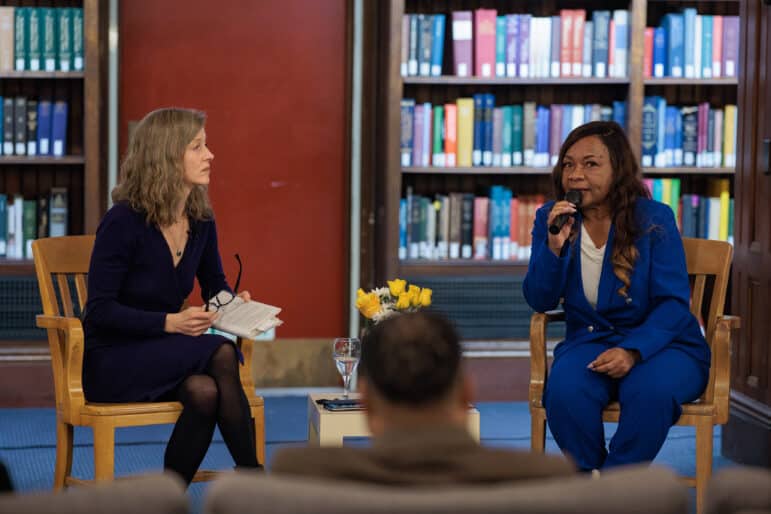
Finding Common Ground on “Holy Ground” with Catherine Flowers
“Know that people can be transformed. I try, in each and every essay in “Holy Ground,” to talk about the power of transformation.”
World-renowned environmental and climate justice activist Catherine Coleman Flowers upheld the “power of transformation” as a central theme of her new book—“Holy Ground: On Activism, Environmental Justice, and Finding Hope”—at an event celebrating its release. The official book launch, hosted by the Center for Earth Ethics at Union Theological Seminary’s Burke Library Reading Room, brought together faith leaders, environmental activists, scientists, academics and community members to engage in conversation about justice, transformation and the power of faith in activism.
Flowers has dedicated her life to fighting for the most vulnerable communities—rural, poor, of color—who have been deprived of their basic right to a clean, safe and sustainable environment. She has been a vice chair of the White House Environmental Justice Advisory Council, a MacArthur fellow, a member of the Biden-Sanders Unity Task Force on Climate Change—and a senior fellow at the Center for Earth Ethics.
The evening began with a warm welcome from CEE Founder and Executive Director Karenna Gore, who introduced Flowers as “a guiding light for the Center.” Gore moderated the discussion, highlighting Flowers’ impact not only in environmental justice but also in the broader climate movement, emphasizing how Flowers’ civil rights background provides a template for addressing today’s ecological crises.
“The issue of the climate crisis can seem so overwhelming, and the anxiety and grief that people feel can be so powerful,” she said. “Thinking back to the courage and fortitude in the Civil Rights Movement is such a gift to people today that want to understand how we can possibly find a counterforce to this.”
The event also featured a musical offering by Bethany Yarrow, who sang songs from the Black Spirituals tradition and the Civil Rights Movement, connecting the evening’s themes of justice, resilience and hope.
Know that people can be transformed. I try, in each and every essay in 'Holy Ground,' to talk about the power of transformation.
Catherine Coleman Flowers
A Legacy of Justice and Faith
“Holy Ground” is a testament to Flowers’ faith and her commitment to justice. She opened by reflecting on the spiritual foundation of her activism, sharing the book’s origin story: a ceremony that she participated in with Gore and other CEE team members at a sacred site—Holy Ground—in her native Lowndes County, outside of Montgomery, Alabama.
The book weaves together her personal history with the ongoing fight for environmental justice, demonstrating how her upbringing and deep rootedness in Lowndes County shapes her activism. “I think that we learn some things by osmosis,” Flowers said when speaking of her parents’ deep involvement in civil rights and the Student Nonviolent Coordinating Committee (SNCC). This legacy of justice, she explained, informs her work today as she fights for clean water, sanitation and environmental protections for marginalized communities.
Faith was a recurring theme throughout the evening, with Flowers using biblical examples to frame contemporary struggles. She spoke of Judas’ betrayal of Jesus as a metaphor for political corruption, warning against leaders who “sell out the community” for corporate interests.
Her faith instills a deep belief in transformation and redemption. This guides her work, which often involves engaging with people who, at first glance, seemed to be adversaries, including Tommy Tuberville and Jeff Sessions. “I think it’s possible to change,” she said. “We have to believe that people can be transformed, and that’s where faith comes in.”
Confronting Injustice and Finding Common Ground
Flowers addressed the role of “shame and secrecy” in perpetuating injustice, drawing connections among forced sterilization of African American women, environmental racism and climate change. “Forced sterilization was just a type of racism, and it’s really akin to what happens with environmental injustice—where the dirty plants are placed next to the poor communities and communities of color,” she said. “And I see that disrespect for a woman’s body as being akin to how we feel about Mother Earth. The people that don’t care about a woman’s body don’t care about climate change either.”
She underscored the urgency of finding common ground in an increasingly polarized world. Flowers has worked with unlikely allies, including politicians from across the aisle, to push forward vital legislation for sanitation and environmental protections in rural communities. “Democracy is in jeopardy because we haven’t been talking to each other enough,” she warned.
We have to keep fighting. We can't roll over. We may not win every battle, but we can win a lot of them. But if we don't fight, we definitely will lose. Stay in the fight.
Catherine Coleman Flowers
A Call to Action
Several attendees asked how to respond to the climate crisis. Flowers emphasized that action must be rooted in both “local ingenuity” and global solidarity, stressing the vital role played by local leaders “that know how to survive and get things done.”
She urged attendees to engage their faith traditions as sources of strength in the face of seemingly insurmountable obstacles, citing biblical stories of resilience. “Those stories gave me power,” she said. “And I think that we have to look to those types of examples today to get through these hard times.”
Flowers ended with a message of perseverance: “We have to keep fighting. We can’t roll over. We may not win every battle, but we can win a lot of them. But if we don’t fight, we definitely will lose. Stay in the fight.”
